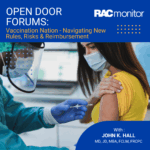The debate over the controversial two-midnight rule rages on.
Ok, I surrender. “This is not the hill I intend to die on” is an accurate metaphor.
There has been here at RACmonitor a flurry of concern, debate, troubled investigation, and notice of dodging by health plans, and, as we’ve come to expect, non-answers from the Centers for Medicare & Medicaid Services (CMS) about Medicare Advantage (MA) plan freedom to move away from binding coverage rules for fee-for-service (FFS) Medicare. While my anxiety is far-ranging, others have focused on the two-midnight rule.
Smarter people than I recommend reviewing managed care contracts for language specific to the two-midnight rule. If it’s in there, enforce it, and if not, negotiate a clause honoring the rule.
When approached about the contract (re)negotiation idea, our contracting executive smiled a “fogetaboutit” smile. She said that regardless of what’s in a contract, there is always the clause that says at any time, the health plan can change the rules. Sign it or leave it. Once again, this affirms my belief that the moneyed interests are not going to start now acting in their long-term best interests. Instead, they will continue to strangle the revenue streams of providers – whom they need – without an obvious endgame.
So there, that’s out of my system. This doesn’t need to be the hill I die on.
That said, Medicare Advantage plan mirroring of FFS Medicare benefits or not, we tend to win overturns of denials of inpatient coverage when the appeal goes to CMS and/or to the California Department of Managed Care.
So I willingly surrender on the benefits debate, instead reframing the conversation back to our old friend, medical necessity. Proving medical necessity compels following the two-midnight rule as a valid benchmark. With each denial overturn, it proves to be a winning strategy.
When the two-midnight rule was first initiated, I raised some eyebrows by insisting this was a much deserved “gimme” (it’s a golf term; Google it.) I’m pretty sure there was a job in Brownsville I was passed over for on this account of this position. By and large, though, my prediction proved true. With the Recovery Audit Contractor (RAC) threat looming again, that which is given may be taken by the CMS gods. Getting to “yes” on inpatient admissions in this environment is going to get tough, and this is the very reason we cannot retreat.
Guidance regarding the two-midnight rule was that as the second midnight approaches, the physician should consider inpatient admission for a patient under observation if care cannot be safely delivered in the intermittent care setting (primary care visits or home healthcare, or HHC, being examples of intermittent care). By extension, an inpatient order at the time of admission is appropriate if the physician reasonably believes that hospitalization of longer than two midnights is necessary before transitioning to intermittent care because this is the safe and sufficiently effective course. Readmission risk concerns are valid considerations in support of inpatient hospitalization.
A national standard used by many hospitals says clearly in the instruction for performing a utilization management (UM) review that meeting inpatient criteria can be done in one of two ways: an outright meeting of acute metrics, or by meeting observation criteria two days running with a prospective look at the third day also qualifying under observation status. The rationale is that observation is a hospitalization, therefore meeting the requirements of the two-midnight rule. And these are still words to live by.
The two-midnight rule is still a valid benchmark, guiding the documentation of medical necessity, the same as always.
For reference to recent opinions on managing Medicare Advantage plans, see the following links:
Health Plan Policy Errs About CMS Two-Midnight Rule
Medicare Advantage Plans and the Two-Midnight Rule






















